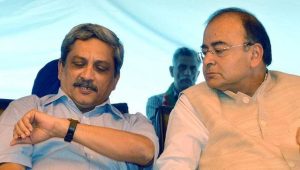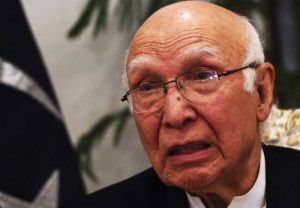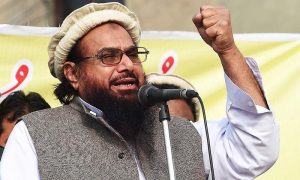New Delhi/Islamabad, August 16 (NIA): Given the slanging match taking place between the two countries on Kashmir and Balochistan, talks between India and Pakistan are unlikely to take place despite Pakistan’ s official invitation to New Delhi for discussions.
To begin with, Indian Finance Minister Arun Jaitley is unlikely to attend a meeting of SAARC Finance Ministers in Islamabad on August 25 and 26, reflecting the sharp dip in ties between the two countries, The Hindustan Times reported on Tuesday.
Soon after news broke that Jaitley would skip the meet in Islamabad, Defence Minister Manohar Parrikar was quoted as saying at Rewari in Haryana state, that “going to Pakistan is the same as going to hell”.
On August 12, Sartaj Aziz, Adviser to Pakistan Prime Minister on Foreign Affairs, had proposed to India a “dedicated dialogue” on Kashmir. On Monday, the Pakistan government followed this up by formally inviting the Indian foreign secretary to visit Islamabad for talks on Kashmir.

Foreign Secretary Aizaz Chaudhry met Indian High Commissioner Gautam Bambawale here and handed him a letter addressed to S. Jaishankar, the Indian foreign secretary, inviting him to visit Pakistan for talks on the Kashmir dispute, Dawn reported.
The letter highlighted the international obligation of both countries to resolve the Jammu and Kashmir dispute in accordance with the resolutions of the UN Security Council, said a statement issued by the Pakistan Foreign Office.
The latest move came despite the Independence Day speech of Indian Prime Minister Narendra Modi in which he spoke about Pakistan’s human rights abuses in Balochistan, Azad Kashmir and Gilgit-Baltistan.
According to Dawn the meeting of the Foreign Secretary with the Indian High Commissioner shows that Pakistan will not allow Delhi to divert the world’s attention from the issue of Kashmir.

Pakistan Prime Minister Nawaz Sharif had told a meeting of Pakistani diplomats that the resolution of the Kashmir dispute in accordance with the wishes of the people of the region and UN resolutions is the cornerstone of Pakistan’s foreign policy.
Dialogue between India and Pakistan, suspended in 2014, is yet to resume. An agreement on reviving the peace talks, which was reached during Indian Prime Minister Modi’s surprise stopover in Lahore in December 2014, did not materialize because of the attack on the Indian Air Force base in Pathankot by Jaish-e-Mohammad, an Islamic terrorist group based in Pakistan.
Last Saturday, India reacted to the Pakistani invitation for talks. The Indian External Affairs Ministry said that Delhi welcomes dialogue on relevant issues which includes “stoppage of Pak-supported cross-border terrorism”.
Ministry spokesperson Vikas Swarup said that before the start of a dialogue Pakistan must address “incitement to violence and terrorism across the border, parading of internationally recognised terrorists like Hafiz Saeed and Syed Salahuddin, and sincere follow up on the Mumbai attack trial and the Pathankot attack investigation”.
Indian External Affairs Minister Sushma Swaraj said: “Unlike in the past we cannot agree that dialogue with the sponsor and supporters of terrorism should carry on without being linked to action in that regard.”
On August 4, Indian Home Minister Rajnath Singh had walked out of a SAARC conference in Islamabad after a
slanging match with his Pakistani counterpart, Chaudhry Nisar Ali on terrorism. Singh had urged SAARC countries not to confuse terrorists with freedom fighters and honor dead terrorists as martyrs. While Singh did not mention Pakistan or Kashmir, Chaudhry Nisar Ali openly dragged in Kashmir, annoying his Indian counterpart.
The past few days have witnessed a marked escalation in tension between the two neighbours after Modi said Pakistan would have to answer for alleged rights abuses in Balochisan, Gilgit-Baltistan and Pakistan-occupied Kashmir. Modi also became the first Indian premier to raise Balochistan in an Independence Day speech on Monday.
Pakistan’s foreign policy chief, Sartaj Aziz, responded to Modi by saying that Modi is trying to divert the world’s attention from the deteriorating situation in Kashmir. He also said Modi’s remarks proves Pakistan’s allegation that India is “fomenting terrorism in Balochistan”.

Call To Invade Kashmir
Meanwhile, the Pakistan-based Jamaat-ud-Dawa (JuD) chief, Hafiz Saeed, asked Pakistan army chief, Gen.Raheel Sharif , to send troops into Kashmir to “teach India a lesson.”
Last month, Saeed had said that the ongoing protests on the Indian side of Kashmir would be intensified and warned that the deaths in the region would not be in vain.
Addressing a meet in Lahore on Tuesday, Saeed said: “This time the people in Kashmir are on streets. This protest has become a mass movement. All groups in Kashmir have united. All wings of the Hurriyat have become one. The Muttahida Jihad Council and all other groups have come on to the same platform. Those who have died in Kashmir, their deaths will not be in vain.”
At least 58 people were killed and several others injured, with both people and security forces turning hostile in protest-related violence in the Kashmir Valley, after Kashmiris took to the streets to condemn the killing of Hizbul Mujahideen leader ,Buhan Wani, on July 8.
Saeed had also revealed that he had motivated Wani to die if necessary in a conversation he had had with the Kashmiri militant. Saeed had also received a phone call from Asiya Andrabi, the founder of separatist Kashmiri group, Dukhtaran-e-Millat, seeking his help.
Warning India, Saeed said that India could either accept separatist Hurriyat leader Syed Ali Shah Geelani’s four-point formula on Kashmir and withdraw the security forces from the Valley, or settle the issue “on the battlefield.”
Saeed had organised a “Kashmir Caravan” from Lahore to Islamabad. The caravan of trucks and buses, stretched for several kilometers and passed through many cities, including Gujaranwala, Jhelum and Gujarat. His rallies were attended by Pakistani federal government ministers and religious leaders.


























































